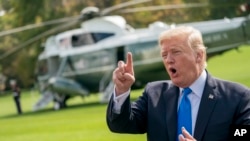ນຶ່ງໃນບາດກ້າວອັນທຳອິດຂອງທ່ານ ດໍໂນລ ທຣໍາ ໃນຖານະປະທານາທິບໍດີ ກໍແມ່ນ
ຖອນສະຫະລັດອອກຈາກພາຄີການຄ້າຂ້າມມະຫາສະໝຸດປາຊິຟິກ ຫຼື TPP ຊຶ່ງເປັນ
ຂໍ້ຕົກລົງການຄ້າເສລີ ທີ່ທ່ານກ່າວວ່າ ສ້າງຄວາມເສຍຫາຍໃຫ້ແກ່ຄົນງານສະຫະລັດ.
TPP ແມ່ນເປັນຈຸດໃຈກາງຂອງອັນທີ່ຮ້ອງວ່າ “ການຫັນ” ສູ່ເອເຊຍ ຂອງອະ ດີດປະ
ທານາທິບໍດີ Barack Obama ຊຶ່ງເປັນການຫັນ ເສດຖະກິດ ການເມືອງ ແລະການ
ທະຫານໄປສູ່ຂົງເຂດດັ່ງກ່າວ ທີ່ມີການເບິ່ງກັນວ່າ ເປັນກະແຈສຳຄັນໃນອະນາຄົດ
ຂອງອາເມຣິກາ.
ເກົ້າເດືອນ ຫຼັງຈາກເຂົ້າຮັບຕຳແໜ່ງເປັນປະທານາທິບໍດີແລ້ວ ການຕັດສິນໃຈຂອງ
ທ່ານທຣໍາທີ່ຖອນໂຕອອກຈາກ TPP ແມ່ນຍັງສືບຕໍ່ ບາງທີ ເປັນຫລັກຖານທີ່ຈະແຈ້ງ
ທີ່ສຸດທີ່ທ່ານຕັ້ງໃຈຈະປະຖິ້ມການຫັນໄປສູ່ເອເຊຍຫລືຢ່າງໜ້ອຍກໍຫັນໄປຍັງເຂດດັ່ງ
ກ່າວ ໃນວິທີທາງຂອງທ່ານເອງ.
ບັນດາເຈົ້າໜ້າທີ່ສະຫະລັດ ຍັງບໍ່ໄດ້ກ່າວວ່າ ເຂົາເຈົ້າຈະເປີດເຜີຍນະໂຍບາຍທີ່ຄ້າຍ
ຄືກັນນັ້ນຫຼື ເພື່ອທົດແທນການຫັນປ່ຽນດັ່ງກ່າວ. ແຕ່ວ່່າຮ່ອງຮອຍຂອງຍຸດທະສາດທີ່ີ
ກວ້າງຂວາງ ອາດປາກົດໂຕຂຶ້ນມາ ໃນອາທິດໜ້ານີ້ ເວລາທ່ານທຣໍາອອກເດີນທາງ
ເທື່ອທຳອິດໄປເອເຊຍ ໃນນາມປະທານາທິບໍດີ.
ການເດີນທາງດັ່ງກ່າວ ຈະຮວມທັງການຢຸດແວ່ທີ່ປະເທດຍີປຸ່ນ ເກົາຫຼີໃຕ້ ຈີນ ຫວຽດ
ນາມ ແລະຟິລິບປີນ. ແຕ່ວ່າບ່ອນທີ່ປະທານາທິບໍດີທຣໍາໄດ້ເລືອກບໍ່ໄປ ນັ້ນໄດ້ກາຍ
ເປັນຫົວຂໍ້ຂ່າວ.
ເຖິງແມ່ນ ປະທານາທິບໍດີທຣໍາ ຈະເຂົ້າຮ່ວມກອງປະຊຸມສຸດຍອດຫລາຍຝ່າຍຂອງ
ASEAN ຢູ່ພີລິບປີນ ແຕ່ລາຍງານຂ່າວ ໄດ້ສະເໜີແນະວ່າ ທ່ານຈະກັບຄືນປະເທດ
ນຶ່ງມື້ກ່ອນກອງປະຊຸມສຸດຍອດປະຈຳປີ ເຂດເອເຊຍຕາເວັນອອກ ຊຶ່ງເປັນກອງປະຊຸມ
ຂົງເຂດທີ່ເພັ່ງເລັງໃສ່ເຂດເອເຊຍອາຄະເນ.
ທ່ານ Abraham Denmark ອະດີດເຈົ້າໜ້າທີ່ສູງສຸດຝ່າຍເອເຊຍຕາເວັນອອກ ທີ່ທຳ
ນຽບຫ້າແຈກ່າວວ່າ ການເຄື່ອນໄຫວດັ່ງກ່າວ ແມ່ນສ່ຽງຕໍ່ການສະແດງໃຫ້ເຫັນວ່າເຂດ
ເອເຊຍອາຄະເນ ບໍ່ແມ່ນບູລິມະສິດ ສຳລັບປະທານາທິບໍດີທຣໍາ.
ທ່ານ Denmark ຜູ້ຊຶ່ງໃນປັດຈຸບັນນີ້ ເປັນນັກຊ່ຽວຊານຢູ່ສູນກາງ Woodrow Wilson ທີ່ນະຄອນຫຼວງວໍຊິງຕັນ ກ່າວວ່າ “ຂົງເຂດດັ່ງກ່າວຈະເຫັນວ່າຈີນຢູ່ທີ່ນັ້ນ ແລະສະຫະ
ລັດບໍ່ໄດ້ຢູ່່. ແລະນັ້ນຈະເປັນສົ່ງສານທີ່ແຈ້ງຂາວ.”
ນີ້ບໍ່ເປັນເທື່ອທຳອິດທີ່ປະທານາທິບໍດີສະຫະລັດ ບໍ່ໄດ້ເຂົ້າຮ່ວມກອງປະຊຸມສຸດຍອດ.
ທ່ານ Obama ກໍບໍ່ໄດ້ໄປຮ່ວມເຊັ່ນກັນໃນປີ 2013 ເພື່ອຮັບມືກັບບັນ ຫາງົບປະມານ
ພາຍໃນປະເທດ ທີ່ໄດ້ເປັນຜົນໃຫ້ມີການປິດລັດຖະບານ.
ບໍ່ເທົ່ານັ້ນ ການເຄື່ອນໄຫວນີ້ ຍັງໄດ້ເຮັດໃຫ້ເກີດການໂຕ້ແຍ້ງ.
ທ່ານ Harry Kazianis ທີ່ສູນກາງຜົນປະໂຫຍດແຫ່ງຊາດ ເພັ່ງເລັງໃສ່ເຂດເອເຊຍ
ກ່າວວ່າ ບັນດານັກການທູດແລະປະມຸກຂອງປະເທດຕ່າງໆຈາກເຂດເອເຊຍ ໄດ້ເວົ້າ
ກ່ຽວກັບ ການຫາຍໜ້າໄປຂອງທ່ານ Obama ຢູ່ໃນວົງການສ່ວນໂຕເປັນເວລາ
ຫລາຍໆປີ.
It was one of Donald Trump's very first actions as president: pulling the United States out of the Trans-Pacific Partnership, or TPP, a free-trade deal he said was hurting the American worker.
The TPP was one of the centerpieces of former President Barack Obama's so-called Asia "pivot" -- an economic, political and military realignment toward a region seen as key to America's future.
Nine months into his presidency, Trump's decision to abandon the TPP remains perhaps the clearest evidence yet he intends to ditch the Asia pivot, or at least pivot there in his own way.
U.S. officials have not said whether they will unveil a similar, definitive policy to replace the pivot. But signs of a broader strategy could emerge next week, when Trump leaves on his first trip to Asia as president.
Trump skipping regional summit
The trip will include stops in Japan, South Korea, China, Vietnam and the Philippines. But it's where Trump has chosen not to go that has attracted the headlines.
Though Trump is attending the ASEAN multilateral summit in the Philippines, reports have suggested he will head home a day before the annual East Asia Summit, a regional meeting that focuses on Southeast Asia.
The move risks sending the message that Southeast Asia is not a priority for Trump, said Abraham Denmark, a former top East Asia official at the Pentagon.
"The region will see that China is there, and the United States isn't. And that will send a very stark message," said Denmark, who is now at the Woodrow Wilson Center for International Scholars in Washington.
It isn't the first time that a U.S. president has skipped the summit. Obama also stayed home in 2013 to deal with domestic budget negotiations that resulted in a government shutdown.
Then, too, the move sparked controversy.
Asian diplomats and heads of state talked about Obama's absence in private circles for years, said Harry Kazianis, who focuses on Asia at the Center for the National Interest.
"Missing one conference doesn't mean that America is leaving the Asia-Pacific or that China is outpacing us or anything like that. But it's an extremely big deal, and they're not going to forget it," Kazianis said.
Regional influence
The move could add to concerns the U.S. is ceding regional influence to China, which intensified after Trump's decision to pull the U.S. out of the Paris climate accord as well as the TPP.
The TPP decision in particular sent shockwaves throughout Asia, and threatened to fundamentally reshape the U.S. economic relationship with the region.
"You can make positive and negative arguments for the TPP -- it was not a net-jobs creator for the U.S. -- but it had great strategic value for the U.S.," Kazianis said. "It was a marker. America was going to be there no matter what. That's lost, and the Trump administration hasn't found a formula to replace that."
Adding to the uncertainty, Trump has also threatened to pull out of the free-trade agreement with South Korea, a longstanding economic and diplomatic partner of Washington.
North Korea
But much of Trump's Asia tour is expected to focus on North Korea, which has dominated the bulk of U.S. foreign policy bandwidth during his first year in office.
Trump hopes to put more pressure on China, in particular, to convince North Korean leader Kim Jong Un to make concessions on his nuclear and missile programs.
Trump has threatened to "totally destroy" North Korea if necessary to defend the U.S. and its allies, at times matching the inflammatory rhetoric typically only seen from the North.
During Trump's trip, Asian diplomats are likely to try to convince the U.S. leader of the need to pursue diplomacy and reduce the level of rhetoric, said Michael Fuchs, a former deputy assistant secretary of state for East Asian and Pacific Affairs.
"War with North Korea is their worst nightmare," Fuchs said.
But Trump will have plenty of time during the 12-day trip to lay out other priorities, and that can't come a moment too soon for many.
"What our partners in Asia are looking for is not whether the Obama policy will continue," Denmark said. "They're looking for what is the Trump policy, what is America's policy now."





